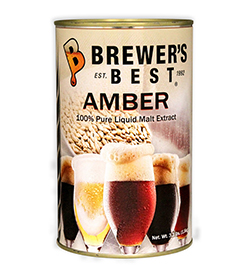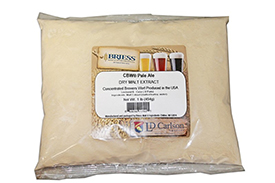Liquid vs. Dry Malt Extract: The Great Beer Making Debate
Posted by Matteo Lahm on 17th Jan 2024
You're standing in your home brewery, staring at two seemingly identical products. One holds liquid malt extract (LME), the other dry malt extract (DME). You scratch your head, wondering if there is a reason why you should choose one over the other? LME and DME are both concentrated versions of wort. They're essentially the heart and soul of your beer, just in a condensed form, so they are the same, but at the same time they are not. What is the difference? Let's break it down for you.
Both start with making wort, which is created by steeping malted grains in hot water. This process, known as mashing, allows the enzymes in the malt to break down the grain's starches into sugars. These sugars are what the yeast will later feast on to produce alcohol and carbon dioxide, transforming your sweet wort into beer.
Now, to create liquid malt extract, or LME, this wort is boiled down until most of the water has evaporated, leaving behind a thick, syrupy liquid. This liquid is then packaged and sold as LME. It's like taking the essence of your beer, the very backbone of its flavor, and bottling it up for later use.
Dry malt extract, or DME, goes through a similar process. The wort is boiled down, but this time it's taken a step further. The concentrated wort is sprayed into a heated chamber, causing the remaining water to quickly evaporate and leaving behind a fine, dry powder. This powder is then packaged and sold as DME.
That said is there a difference in flavor or integral quality and is LME better because it is less processed? It is true that liquid malt extract (LME) undergoes a less intensive process compared to dry malt extract (DME). The wort for LME is simply boiled down to a syrup, while the wort for DME is further dried into a powder.
Now, does this mean LME maintains more flavor? Well, it's not as straightforward as you might think. While it's true that LME retains a rich, malty flavor due to its liquid form, it's also more susceptible to flavor changes over time. LME can darken and develop a more caramel-like flavor if not stored properly or used quickly after opening.
On the other hand, DME, due to its dry nature, is more stable and less prone to flavor changes over time. It can be stored for longer periods without significant changes in flavor or color. However, some brewers argue that the additional drying process can result in a slightly less 'fresh' malt flavor compared to LME.
In the end, the choice between LME and DME often comes down to personal preference and brewing style. Some brewers swear by the rich flavor of LME, while others prefer the stability and consistency of DME. It's all about finding what works best for you and your beer.
So, either way, when you use LME or DME, you're essentially skipping the mashing step and jumping straight to the boil. You're taking a shortcut, yes, but you're still using the same basic ingredients. You're still creating wort, just in a more convenient, time-saving way.
In essence, LME and DME are like the cheat codes of brewing. They let you skip ahead to the good parts, without sacrificing the quality or flavor of your beer. They're the secret weapon in your brewing arsenal, ready to help you create delicious beer, no matter your skill level or brewing setup.
Now, why would you choose one over the other? Well, it's like deciding between a sports car and a pickup truck. Both will get you from point A to point B, but the ride might be a bit different.
Liquid malt extract is like that sports car. It's sleek, it's easy to handle, and it's ready to go right out of the gate. You can pour it straight into your brew kettle, no extra steps required. But just like a sports car, LME can be a bit finicky. It's prone to darkening over time, which can affect the color and flavor of your beer. And once you open it, you better use it quickly or it'll go stale.
On the other hand, dry malt extract is your reliable pickup truck. It's a bit harder to handle - you'll need to dissolve it in water before you can use it - but it's sturdy and dependable. DME has a longer shelf life than LME, and it won't darken or change flavor over time. Plus, you can measure out exactly how much you need and save the rest for later.
So, which one should you use? Well, that depends on you and your brewing style. If you're all about convenience and speed, LME might be your best bet. But if you value consistency and flexibility, you might want to go with DME. Also if you want to buy in bulk and store it longer, DME is also the best choice.
Remember, there's no right or wrong answer here. It's all about what works best for you and your beer. So go ahead, experiment. Play around with both LME and DME. Find out which one suits your brewing style best. After all, the beauty of home brewing is in the freedom to create your own unique brews.
So, whether you're a fan of the sports car or the pickup truck, remember this: it's not about the journey, it's about the destination. And in this case, the destination is a perfectly brewed beer. Cheers!



